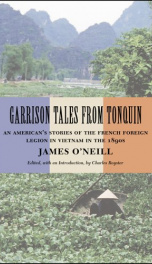garrison tales from tonquin

Enlisting in the French Foreign Legion has long held a tantalizing allure for Americans, especially for young men in search of adventure. Outside their fantasies, though, few Americans ever joined the legion. It is, therefore, a surprise to discover these extraordinary short stories, written by a legionnaire who was born in Bridgeport, Connecticut. James O'Neill enlisted in the legion in 1887, at the age of twenty-seven. He found himself, in 1890, deployed to Tonquin in French Indochina, more familiar today as Tonkin, Vietnam. O'Neill faced tropical heat, infectious disease, and sudden death, but, like his contemporary Stephen Crane, he was blessed with a reporter's sense of the telling detail and a novelist's ability to tell an engaging story. In these thirteen "tales," O'Neill showswith surprising subtletythat France's efforts to conquer and govern Indochina were foolhardy. Although the only American in his stories is the narrator, it is clear that the tales are aimed at readers in the United States and are intended to caution against the construction of empires abroad. However, these are not polemical tirades. They are absorbing, unadorned stories, remarkably contemporary in both style and substance. Charles Royster provides a short biography of O'Neill, who seems to have vanished into obscurity a few years after these stories were first published in 1895. Royster has also unearthed and included two essays O'Neill published in magazines of the time, one a description of a Buddhist temple in Hanoi and the other an appreciation of the Hungarian novelist Maurus Jókai. Whether read for historical value, literary merit, or political insights, Garrison Tales from Tonquin is a true discovery.
Info about the book
Author:
Series:
Unknown
ISBN:
0824068912
Rating:
2/5 (40)Your rating:
0/5
Languge:
English
Users who have this book
Users who want this book
What readers are saying
What do you think? Write your own comment on this book!
write a commentGenre
if you like garrison tales from tonquin try:
Other books by this author
Do you want to exchange books? It’s EASY!
Get registered and find other users who want to give their favourite books to good hands!

